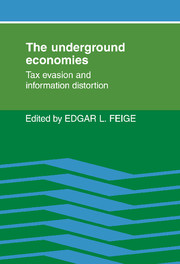Book contents
- Frontmatter
- Contents
- List of contributors
- Preface
- Introduction
- Part I The meaning, measurement, and policy implications of the underground economies
- 1 The meaning and measurement of the underground economy
- 2 Information distortions in social systems: the underground economy and other observer – subject – policymaker feedbacks
- 3 Policy illusion, macroeconomic instability, and the unrecorded economy
- 4 How large (or small) should the underground economy be?
- Part II The underground economy in Western developed nations: measurement in different laboratories
- Part III The underground economy under central planning
- Bibliography
4 - How large (or small) should the underground economy be?
Published online by Cambridge University Press: 20 October 2009
- Frontmatter
- Contents
- List of contributors
- Preface
- Introduction
- Part I The meaning, measurement, and policy implications of the underground economies
- 1 The meaning and measurement of the underground economy
- 2 Information distortions in social systems: the underground economy and other observer – subject – policymaker feedbacks
- 3 Policy illusion, macroeconomic instability, and the unrecorded economy
- 4 How large (or small) should the underground economy be?
- Part II The underground economy in Western developed nations: measurement in different laboratories
- Part III The underground economy under central planning
- Bibliography
Summary
The existence and growth of the unobserved economy entail both advantages and disadvantages. One of the major benefits is often considered to be the fact that it is one of the most productive and enterprising sectors of the economy, without which the population would be materially much worse off. An Italian author (Martino 1980, p. 2) states, for instance: “The so-called underground economy in Italy [is] a masterpiece of my countrymen's ingenuity, a second Italian miracle which has saved the country from bankruptcy.” According to this view, the problem is not that people are active in the unobserved sector (they are simply responding rationally to the heavy burdens imposed upon them in the official economy) but rather the fact that the official economy is badly managed.
The major disadvantage is then thought to be that (a large part of) the unobserved economy is illegal and that its toleration would erode tax morality, leading to a general breakdown of law and order. Also, the falling revenue due to tax evasion is taken to create serious problems for the financing of those goods and services the population desires to have publicly provided. To compare the private as well as the social benefits and costs and to derive therefrom “social optimal” conditions has always been one of the main contributions of economics. Indeed, the theory of quantitative economic policy as developed in particular by Tinbergen (1952) and Theil (1968) provides a well-developed formal apparatus to deal with such comparisons at a macroeconomic level. An aggregate welfare function specifies the value “society” attributes to alternative states of the world, thus enabling a comparison between benefits and costs.
- Type
- Chapter
- Information
- The Underground EconomiesTax Evasion and Information Distortion, pp. 111 - 126Publisher: Cambridge University PressPrint publication year: 1989
- 18
- Cited by



